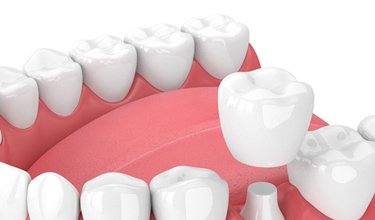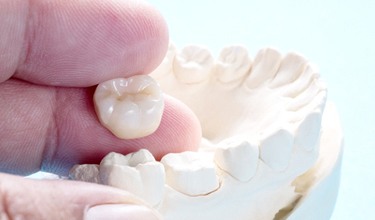Dental Crowns Carrollton
Repair Broken & Weakened Teeth Seamlessly
Even though tooth enamel is harder than your bones, there are plenty of ways to damage it. Unfortunately, unlike your bones, enamel cannot heal itself once it has become weakened or damaged. The compromised tooth will just continue to become more damaged over time, putting you at a higher risk of a dental infection or irreparably damaged pearly white. At DD Family Dentistry of Carrollton, we can repair broken and weakened teeth seamlessly with beautiful, custom-made dental crowns! These simple restorations in Carrollton will enhance the look and function of your tooth while protecting it from further issues. Read on to learn more and give us a call today to schedule your next appointment.
Why Choose DD Family Dentistry of Carrollton for Dental Crowns?
- Natural-Looking Zirconia Used
- Patients of All Ages are Welcome
- Convenient Saturday Appointments
What is a Dental Crown?

A dental crown is a tooth-shaped cap that encapsulates the entire portion of a tooth above the gumline. This holds the weakened tooth together and strengthens it. Not only does this keep the damage from advancing, but it protects the exposed inner layers of the tooth from infection as well. Dental crowns are made of dental porcelain, which is well-known for its resilience and ability to look just like tooth enamel. Your dental crown will be shaded to match the color of your teeth and carefully crafted to look as lifelike as possible, so the result will blend in seamlessly with the rest of your smile.
Dental crowns are often used for teeth that are:
- Cracked, broken, or fractured
- Weakened by severe decay or a large filling
- Naturally small or misshapen
- Repaired with a root canal
- Missing and replaced with a dental implant
The Process of Getting a Dental Crown

Getting a dental crown typically takes two appointments. First, we’ll prepare your tooth by roughening its surface and removing just enough enamel to allow room for the crown. Then, we’ll take impressions of the area and fit you with a temporary crown. You’ll wear this crown for about a week or two while the impressions are used to create your custom-made crown. Then, once we receive it, we’ll call you back into our office to have your temporary crown removed and your permanent crown cemented into place. We’ll check to make sure your bite feels comfortable and that you’re pleased with the results, and then you’ll be all set to go out and enjoy your newly repaired smile!
Benefits of Getting a Dental Crown

If you’re looking for a reliable, cost-effective, and natural-looking way to repair your broken or weakened tooth, there’s simply no better choice than a dental crown. If you choose to repair your smile with a dental crown, you can enjoy benefits like:
- No more pain, discomfort, or sensitivity when eating or talking
- Protect the tooth from worsening damage and future infections
- Avoid the need for a root canal or tooth extraction in the future
- Beautiful, lifelike results that look just like a natural tooth
- Durable construction that resists breakage and can last for many years
Dental Crown FAQs
Are dental crowns permanent?
Dental crowns aren’t technically permanent, but they are a long-term solution. On average, they can protect your teeth for anywhere between 5 and 15 years. When your dentist reshapes your tooth for a crown, this procedure is irreversible, as enamel cannot grow back, so you will always need to have a crown going forward. However, crowns protect your underlying tooth from additional damage, helping the tooth to survive much longer than it would have otherwise.
Do dental crowns get cavities?
It is impossible for a dental crown itself to develop cavities. However, the underlying tooth is still susceptible to decay. In fact, a crowned tooth has about the same risk of decay as an uncrowned tooth. Poor oral hygiene makes it possible for bacteria and plaque to form around the gumline where the tooth meets the crown. They can then travel underneath the crown and cause problems for the underlying tooth. You can prevent cavities in crowned teeth the same way you would for any other tooth. Brush, floss, and see your dentist for regular cleanings and checkups.
Does it hurt to get dental crowns?
Just like with a filling, your dentist will numb the tooth before the procedure begins. While you shouldn’t feel any discomfort, your tooth will likely feel sensitive for a few days afterward, especially if you have also undergone a root canal. This can typically be managed with over-the-counter pain relievers but give us a call if the discomfort worsens.
Do dental crowns feel natural?
Within a few days of receiving your permanent crown, it should begin to feel increasingly natural. Crowns are made from durable materials that can stand up to everyday chewing forces just as easily as natural tooth enamel, so eating with your crown shouldn’t feel strange. Additionally, your crown is made based on impressions taken of the tooth. Ultimately, your crown should not feel awkward or even noticeable.

